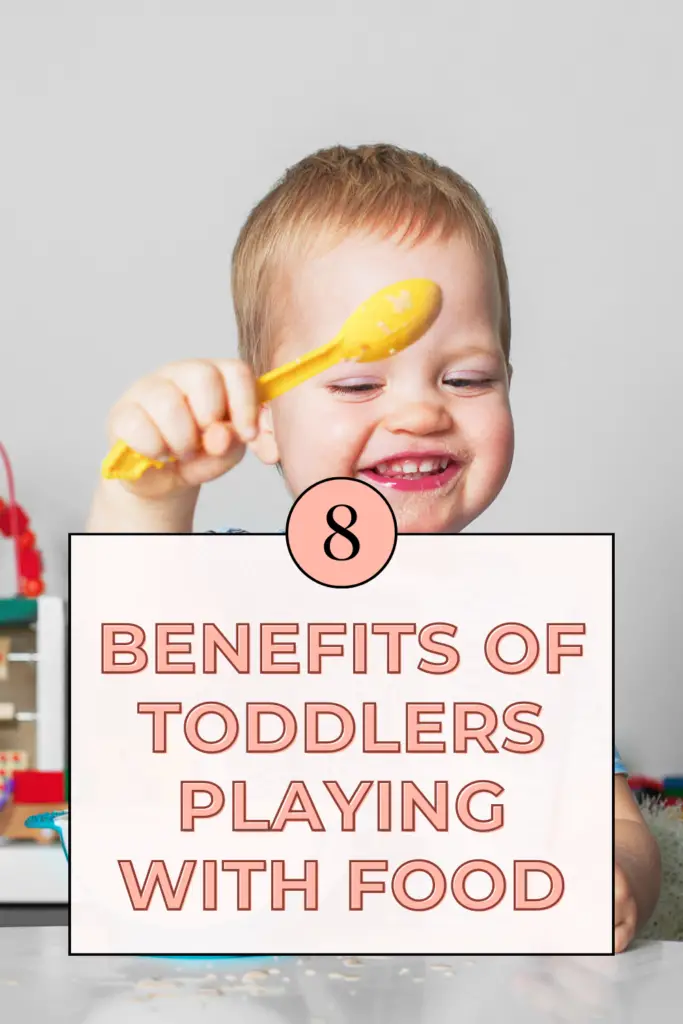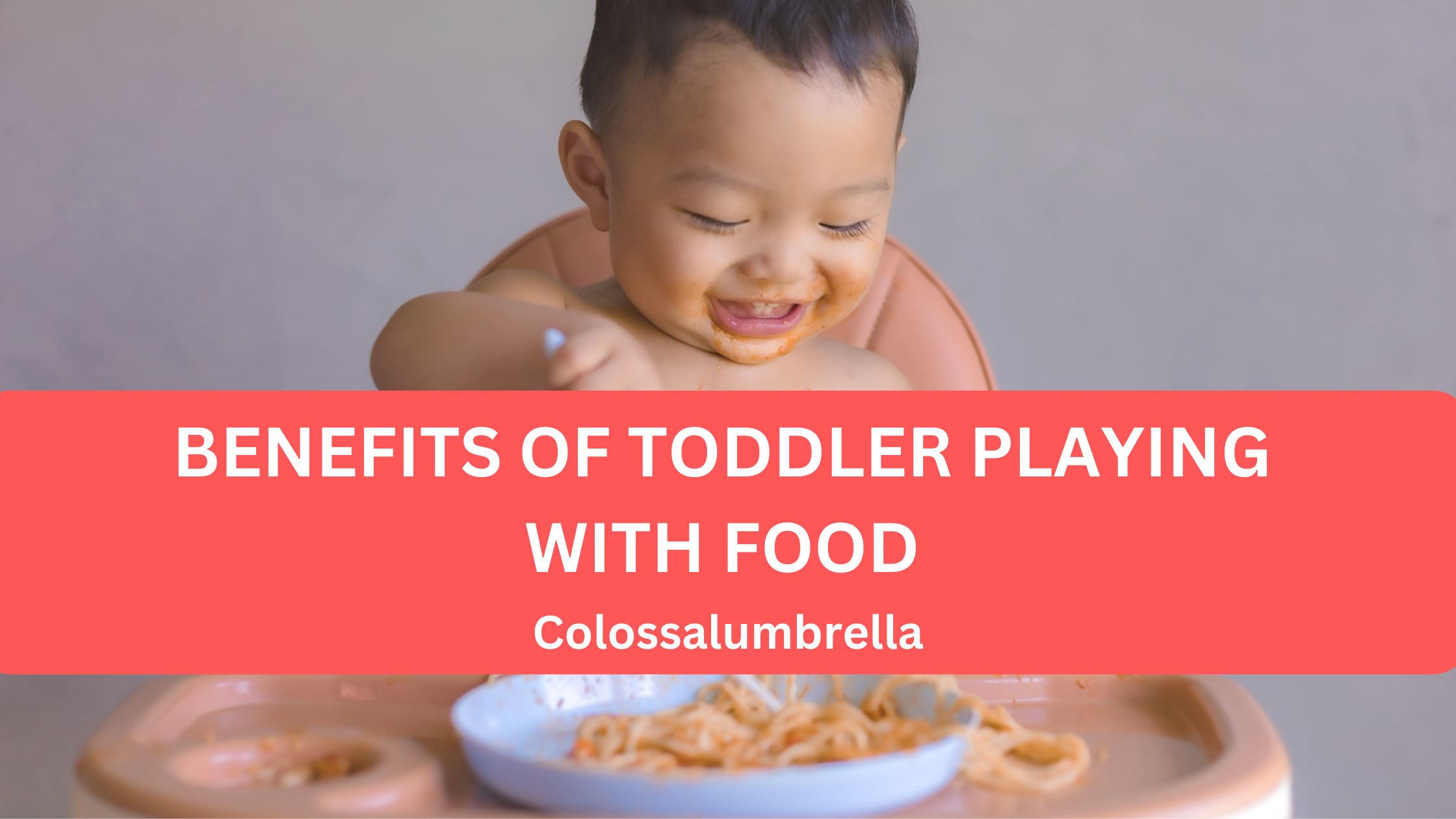Contents
The cacophonous clatter of a spoon against a highchair, the splattering of peas and the flourishes of spaghetti sauce painting the table, are not mere signs of a messy mealtime. Instead, these are the hallmark noises and sights of a child’s development in progress. Though it might seem counterintuitive, permitting toddlers to explore their organic toddler snacks through play can yield incredible benefits for their growth. This article will highlight 8 important reasons why playing with food is good for toddlers and significantly boosts their development.
8 Reasons why playing with food is good for toddlers
Stimulates Sensory Exploration
When toddlers engage with their food beyond mere consumption, they explore the world of sensory stimulation. Different foods’ textures, colors, smells, and temperatures allow children to expand their sensory horizons. Children refine their touch perception as they squish, squash, and smear their meals. This sensory exploration plays a significant role in developing fine motor skills and fostering an understanding of the world around them.
Enhances Fine Motor Skills
Fine motor skills involve small muscle movements and are crucial for tasks such as writing, buttoning a shirt, or tying shoelaces. Playing with food encourages the use of these muscles. Picking up peas, scooping yogurt, or threading spaghetti on a fork all require precision and control, thereby improving dexterity and hand-eye coordination. In addition to enhancing dexterity and hand-eye coordination, developing fine motor skills through activities like playing with food also promotes cognitive development.
By engaging in these tasks, children are not only refining their physical abilities but also honing their problem-solving skills and fostering creativity. Furthermore, practicing fine motor skills can have long-lasting effects, as individuals with well-developed fine motor skills tend to exhibit better handwriting, improved attention to detail, and increased independence in various everyday tasks.
Encourages Healthy Eating Habits
It might seem paradoxical, but food play can significantly influence a child’s eating habits. By allowing toddlers to explore different foods without the pressure of eating them, they can naturally become more curious and accepting of various tastes and textures. This openness can foster a healthier relationship with food, encouraging a balanced diet and reducing the risk of picky eating.
Subscribe to my blog for Parenting tips that will make you feel like a pro, and get access to exclusive free Printables that will keep your little ones busy and happy!
Promotes Cognitive Development
Playing with food can stimulate cognitive development by providing opportunities for problem-solving and discovery. For instance, a child may learn about cause and effect when they see a splash resulting from dropping a piece of fruit into their drink. Additionally, categorizing foods by their shapes, sizes, and colors aids in enhancing pattern recognition and mathematical concepts.
Boosts Language Acquisition
Food play offers a rich platform for language development. As toddlers interact with food, parents can describe the food’s texture, taste, color, and smell, thereby introducing new vocabulary. Words like crunchy, smooth, sweet, or sour enrich their language and build a foundation for more complex sensory descriptions.
Fosters Social Skills
Mealtimes can be a social event, and food play is integral to this. Toddlers learn valuable social skills by sharing food, taking turns, and interacting with adults and peers. They begin to understand concepts such as sharing and cooperation and become more aware of cultural practices and norms related to food and eating. Moreover, engaging in food play encourages social interaction and communication skills.
Toddlers can converse with their parents or peers, discussing their favorite flavors, sharing their preferences, and expressing their reactions to different foods. These interactions create opportunities for turn-taking, active listening, and the development of conversational skills. Furthermore, food play can spark imagination and storytelling as children transform ordinary ingredients into imaginary creations, fostering their narrative abilities and imaginative thinking.
Teaches Science Concepts
Playing with organic toddler snacks can introduce basic science concepts early. It offers a hands-on experience of learning properties of matter like solid, liquid, and gas. They can observe how water boils, and ice melts, or bread toasts. This active interaction with food can lay the groundwork for later scientific learning and curiosity.
Encourages Independence and Confidence
Finally, allowing your toddler to play with their food can foster a sense of independence and confidence. It gives them control over a small aspect of their lives, offering an opportunity to make choices, thus encouraging decision-making skills. This sense of autonomy promotes self-esteem and paves the way for them to become confident, independent individuals.

Conclusion
While it may require an extra dose of patience and perhaps a more frequent cleaning schedule, the advantages of letting your toddler play with their food are considerable. This unstructured, messy play can stimulate sensory exploration, enhance motor skills, promote cognitive development, and much more. As parents and caregivers, redefining the perspective on food play from a messy nuisance to an essential developmental tool can ensure that mealtimes are not just about nourishing the body but also enrichment of the mind. Embrace the mess, for it’s a colorful canvas of your child’s development.
I would stay connected and keep you updated with parenting tips, pregnancy guides, creative ideas, easy crafts, and Free Printables. Subscribe to Colossalumbrella to get new ideas delivered to your inbox. Follow me on Facebook, Pinterest, Twitter, and Instagram.
